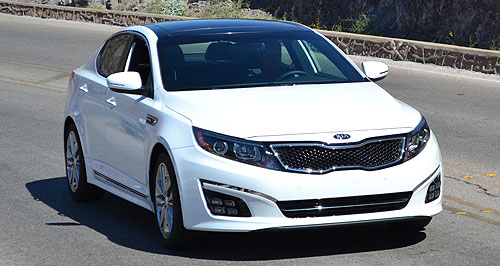Kia’s Optima Turbo engineered for economy
BY DANIEL GARDNER | 6th Apr 2015

Displacing 2.0 litres, the 2016 Kia Optima Turbo has the same-sized singe-turbo engine as the outgoing model sold in the United States, but the updated version has a smaller twin-scroll turbocharger that cuts power by 20kW – from 204kW to 184kW.
However, Kia says the smaller blower has reduced turbo lag, shifting peak torque lower down the rev range, and in combination with a specially tailored six-speed automatic transmission 0-100km/h acceleration has been cut to 7.3 seconds (down from 8.0s).
In addition to the engine modifications, the transmission tweaks have matched the gear ratios to the altered torque characteristics, while a new 100 per cent lock-up torque converter ensures less power is wasted, allowing better performance and reduced fuel consumption.
While Kia has not released exact fuel economy figures for the new Turbo, with the new fettled four-cylinder engine it will better the current turbocharged version, which uses about 9.8 litres per 100km.
Speaking at the New York International Auto Show last week, Kia Motors America product planning vice-president Orth Hedrick explained to Australian media why the outgoing big-turbo engine needed improving.
“You have to wait until the engine revs up, the turbo spools up and delivers the power, and at the same time the transmission has to move all that,” he said. “We call it a rollercoaster ride.
“It’s slow and then at the very end you get this massive rush of power, which is great if you are a teenage kid and you want a thrill ride, but for the average US buyer what’s more important is to have the vehicle react very quickly at part throttle.”With the improvements to engine and transmission operation, Mr Hedrick said the new Turbo would accelerate faster, despite the reduction in power and torque.
“Given the faster transmission of power to the ground we are able to get the same and sometimes improved zero-to-60mph times with the new set-up, even though the horsepower is down. We can get a faster response so it’s quicker.”At the bowser, US drivers have a maximum petrol octane-rating option of 91, but Mr Hedrick said tuning the Australian-spec Optima Turbo to run on local higher-grade fuel of up to 98 or 100 RON was a possibility, resulting in more power.
Exact local specification, performance and fuel-economy figures will be announced ahead of the Optima Turbo’s Australian debut late this year and will arrive alongside a naturally aspirated 2.4-litre version, which was available in the previous model.

